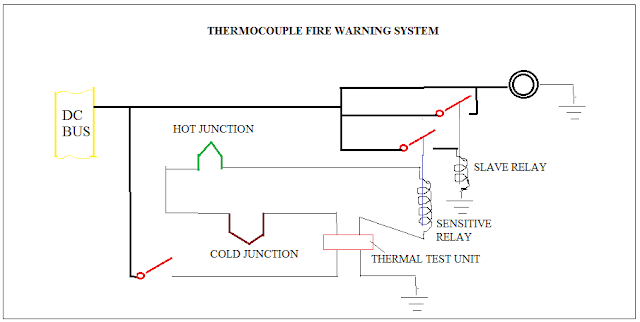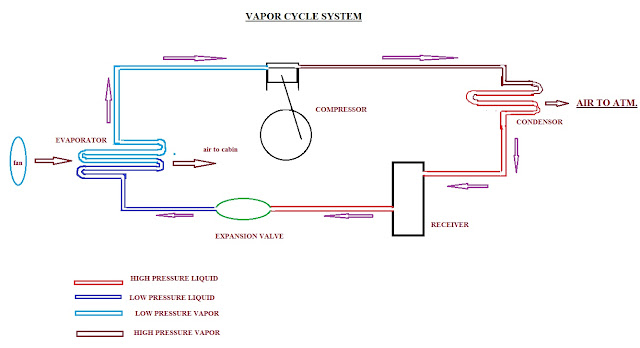Aircycle cooling system in aircraft
Why we need aircraft's cabin
pressure and temperature to be controlled?
At atmospheric condition we have sufficient pressure to breath
freely. As the altitude increases pressure drops. Till 8,000 ft altitude the
pressure variation won’t affect us but beyond that we will get affect
(hypoxia), so in order to have same pressure to breath freely in the cabin of
aircraft, we need to go for maintaining the pressure artificially.
As like pressure temperature also drops as the altitude increases,
but up to certain layer of atmosphere which is stratosphere. Most of the
aircraft are operating within Stratosphere. So we need to have a constant
temperature in our cabin, so that passengers feel the comfort of their
travel.
What are the methods in practice for maintaining cabin pressure and
temperature?
Air cycle system
Vapor cycle system
Explain Air cycle cooling system of cabin atmosphere control with neat figure?
. Left
engine
2. Right
engine
3. Flow
limiter
4. Primary
heat exchanger
5. Primary
heat exchanger bypass valve
6. Shut
off valve
7. Compressor
8. Secondary
heat exchanger
9. Water
separator
10. Secondary
heat exchanger bypass valve
11. Refrigeration unit
1. Air from the compressor sections of the two engines is taken
for air conditioning and pressurization. We are making a cross connection so
that it can supply uniform flow of air.
2. Air is going to the flow limiter. Flow limiter limits the
amount of compressed air to entry into the system. Suppose if there is any
pipeline ruptured in air cycle system, then flow limiter won’t allow the compressed
air to enter into the air cycle system.
3. Partial amount of air from the flow limiter goes to the primary
heat exchanger. Primary heat exchanger utilizes ram air for cooling purpose.
The compressed air taken from the engine compressor may be at temp range of 200
deg to 400 deg Celsius. We are cooling the air without reducing much pressure
by using heat exchanger, and heat exchanger works on Convective type.
4. Another amount of compressed air from flow limiter goes to
mingle with the heat exchanger outlet air to make a constant temperature air of
300 °F. This constant temperature can be attained only by proper operation of
Primary heat exchanger (PHE) bypass valve. For example if heat exchanger outlet
air is at 200°F, but I need an output of 300°F at outlet portion of Primary
heat exchanger bypass valve, so we are opening the bypass valve for some
designated time and mixing the hot(directed from flow limiter) and cold (PHE
outlet ) flows.
5 .This 300°F temperature air is going to split for three Purpose
a) For
Anti-icing
b) To supply
hot air to cabin(if required)
c) To
refrigeration unit
6. This 300°F air can be directly used for anti-icing and de-icing
purpose. This air will be taken by the tubes and will be sprayed on the leading
edge through suitable arrangements. And one part of the 300°F air flow is
directed to the cabin for hot air supply.
7. Remaining part of the air is directed towards
refrigeration unit for further cooling. On the way there is main control that
is “Main shut off Valve”. This can be directly controlled by the pilot.
8. After main shut off valve there is Refrigeration unit, this
contains
a) Compressor
b) Turbine
c) Water
Separator
Both turbine and compressor are connected by the same shaft.
9. The air flows to the compressor region; there it strikes the
compressor blade and makes rotating at initial. After compressor starts it
compresses the air and Pressurizes the air so some amount of heat may be added
to the air. Then Air is going to the Secondary heat exchanger (SHE), where the
heat from the air is taken by the ram air by convection. The air has been
cooled now.
10. The output of SHE goes to the Turbine. Since because of the
turbine, here the cold gas is allowed to expand, so that pressure drops,
temperature again drops, it may be on some minus °F sometimes.
11. After expansion in the turbine, air which is in a circular
motion is allowed to go for the water separator region for separation of water
particles in the cold air. Since water particles are denser than air they get
attached to the walls of the water separator due to centrifugal force. In some
specified place there are some holes made on the water separator to drain the
water particles attached.
12. In the cabin we need only a temperature range of 60°F-125°F
(15°C-51°C) and a pressure of 3p.s.i. which is suitable for human.
13. By opening and closing the refrigerant bypass valve, we can
mingle the pure cold air and 300°F air, to make a possible living temperature
for human beings.
14. After maintaining to proper temperature and pressure the air
is allowed to go to the cabin by suitable pipelines.
15. If there is any problem on the total system means, we can
directly mix the hot air supply with ram air (which is taken near SHE) and maintain
the proper temperature by proper mixing. But this method is only for emergency
purpose. Please note when using this ram air method of cooling pressurization
should be done separately by cabin superchargers or whatever the device builds
up pressure.




Thanks
ReplyDeleteTq
DeleteGreat Article! I got too much information regards HVAC Services and I will follow this tips. Thanks for sharing such a helpful article. Click here to more information about it
ReplyDeleterent a chiller, When your website or blog goes live for the first time, it is exciting. That is until you realize no one but you and your.
ReplyDelete